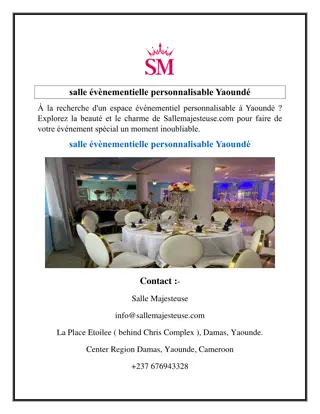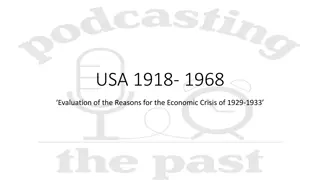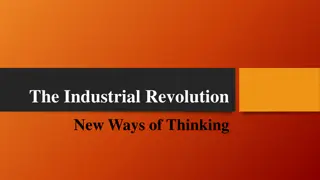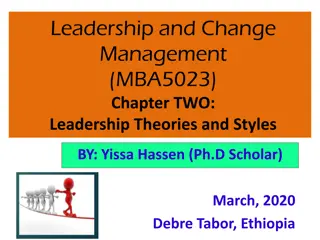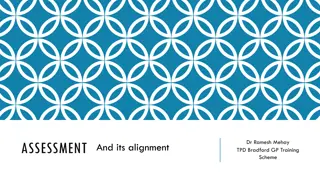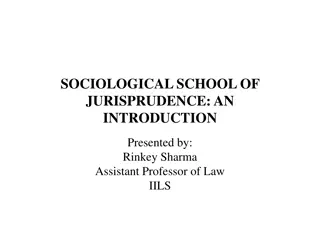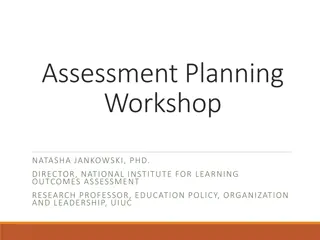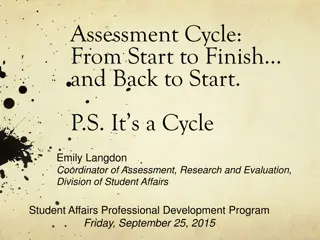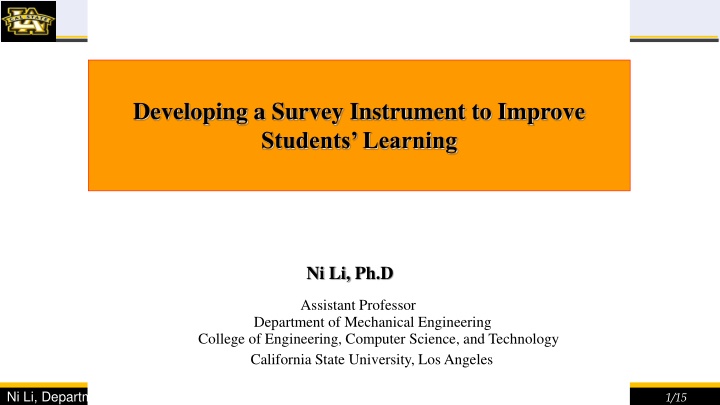
Enhancing Student Learning Through Survey Instruments in Mechanical Engineering Education
This research focuses on developing survey instruments such as pre-knowledge surveys and progressive surveys to improve students' learning outcomes in mechanical engineering courses. By utilizing these surveys, instructors can better understand students' knowledge levels, track their performance, and tailor teaching content accordingly. The surveys serve as valuable tools for both students to prepare for classes and instructors to enhance teaching effectiveness.
Download Presentation

Please find below an Image/Link to download the presentation.
The content on the website is provided AS IS for your information and personal use only. It may not be sold, licensed, or shared on other websites without obtaining consent from the author. If you encounter any issues during the download, it is possible that the publisher has removed the file from their server.
You are allowed to download the files provided on this website for personal or commercial use, subject to the condition that they are used lawfully. All files are the property of their respective owners.
The content on the website is provided AS IS for your information and personal use only. It may not be sold, licensed, or shared on other websites without obtaining consent from the author.
E N D
Presentation Transcript
Developing a Survey Instrument to Improve Students Learning Ni Li, Ph.D Assistant Professor Department of Mechanical Engineering College of Engineering, Computer Science, and Technology California State University, Los Angeles Ni Li, Department of Mechanical Engineering, ECST 1/15
Different Survey Types 1: Pre-knowledge Survey 2: Progressive Survey 3: Post-exam Self-reflection Survey 4: Post-knowledge Survey Ni Li, Department of Mechanical Engineering, ECST 2/15
Pre-knowledge Survey How to prepare students to be ready for class? Syllabus? Facts: My previous survey questions : I have read syllabus . - Only around 40% of students choose Yes Syllabus should not be the only method! Pre-knowledge Survey: - Learning objectives are framed as questions - In each question, students are asked to rate their level of confidence Ni Li, Department of Mechanical Engineering, ECST 3/15
Pre-knowledge Survey Example (ME3210: Kinematics of Mechanism) One of class objectives: Student will have ability to analyze positions of a four-bar mechanism Results 80 70 60 # of students 50 40 30 20 10 0 1 2 3 4 5 A B C 4 Ni Li, Department of Mechanical Engineering, ECST 4/15
Pre-knowledge Survey Objective Students: Know what will be learned in this course Instructor: Know students level and can adjust teaching contents accordingly 5 Ni Li, Department of Mechanical Engineering, ECST 5/15
Progressive Survey How to track students performance? How to determine which contents need to be reviewed? Progressive Survey: - Ask students questions related to key contents - In each question, students are asked to rate their level of confidence - Can use pre-knowledge survey question, or create more questions related to key class contents Ni Li, Department of Mechanical Engineering, ECST 6/15
Progressive Survey Example (ME3200: Dynamics) Use 0-5 to present level of knowledge and confidence 1. 2. 3. 4. 5. 6. Do you know what the planar motion the rigid body is doing? Do you know how to find IC point? Do you know how to find the velocity of a point or the angular velocity of a rigid body? Do you know how to find the acceleration of a point or the angular acceleration of a rigid body? Do you know how gear works? Do you know how to apply the equation of translational motion and rotational motion about the mass center G, rotation center O, or other point? Do you know how to calculate moment? How to decide whether the moment is positive or negative? Do you know how to calculate moment of inertia? Do you know in which situation, the force does not do work? 7. 8. 9. 5 Results 4.5 4 3.5 Average Score 3 2.5 2 1.5 1 0.5 0 1 2 3 4 5 6 7 8 9 7 Ni Li, Department of Mechanical Engineering, ECST 7/15
Progressive Survey Objective Students: Compare their learning with peers and self analyze the reasons for the outcomes Instructor: Know which content(s) need to be reviewed/repeated in the limited class time 8 Ni Li, Department of Mechanical Engineering, ECST 8/15
Post-exam Self-reflection Survey How to help students improve performance in the exam? Facts: Gave the students exactly same questions in the mid-term exam - Only around average 30% of students got full credit Post-exam Self-reflection Survey Ni Li, Department of Mechanical Engineering, ECST 9/15
Post-exam Self-reflection Survey Example (ME 3200: Dynamics) Partial Results I will read the question carefully. I will take more time to understand the concepts. Redo Examples from homework and lecture notes. Study with a group and go over each problem I am going to do more practice which includes doing homework and lecture problems more than once. If I have a very concerning question I will ask my instructor. I need to review my lecture notes and redo most of the examples so that I know which equation to choose when reading and analyzing the problem. Etc. 10 Ni Li, Department of Mechanical Engineering, ECST 10/15
Post-exam Self-reflection Survey Objective Students: Compare their reasons with peers to avoid similar mistakes Instructor: Can change teaching methods accordingly 11 Ni Li, Department of Mechanical Engineering, ECST 11/15
Post-exam Self-reflection Survey Actual data (ME 3200: Dynamics) Average score 75 90 70 80 70 59 60 50 40 30 20 10 0 Exam 1 Exam 2 Exam 3 12 Ni Li, Department of Mechanical Engineering, ECST 12/15
Post-knowledge Survey How to check students learning efficiency? Redo pre-knowledge survey again at the end of semester Ni Li, Department of Mechanical Engineering, ECST 13/15
Pre-knowledge Survey Objective Students: Self check learning efficiency Instructor: - Check teaching efficiency - Can analyze whether the contents are appropriate for students 14 Ni Li, Department of Mechanical Engineering, ECST 14/15




